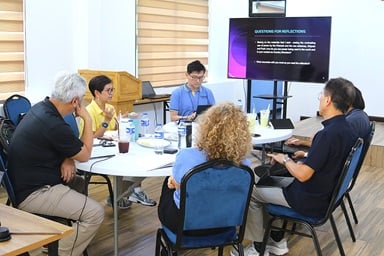A United Nations report has identified the Philippines as the country that is the third most at-risk for disaster because of climate change — after the South Pacific island nations of Vanuatu and Tonga.
One of the most vulnerable areas in the Philippines is the Tarlac province in Central Luzon, so the Rev. Marcos Tamega Jr., United Methodist district superintendent in Tarlac Central District, was grateful for training on how to reduce risk for disasters.
He joined 30 participants from 11 countries at an international disaster training session in Manila, Philippines, sponsored by the United Methodist Committee on Relief in February. "The training really transformed and enlightened my perspective," Tamega said.
Bishop Ciriaco Francisco of the Davao area was among the six delegates from The United Methodist Church in the Philippines who participated in the event. “It is important for everyone to know the basics in risk reduction and management, like disaster preparedness, mitigation, response and rehabilitation," he said.
Both gave some examples of ways in which they think United Methodists could better prepare for annual disaster-related issues.
For the Davao area, Francisco said he hopes to conduct training on disaster preparedness; organize churches, district or conference disaster response teams; educate church members on disaster awareness and risk reduction; develop a relief depot where food, clothing, medicines and other supplies will be kept, and establish a fast and reliable communication system to be used in times of disaster.
The National Disaster Risk Reduction and Management Council estimated property damage from Typhoon Haiyan (Hagupit) in November 2013 at $3.2 billion Philippine dollars ($79.5 million U.S.).
That figure included damage to infrastructure and the agricultural economy of Calabarzon, Mimaropa, Bicol, Western Visayas and Eastern Visayas. More than 8,000 houses were destroyed and more than 31,000 damaged.
More than 6,000 died and about 2.7 million people were affected by Typhoon Haiyan in Central and Southern Luzon, Bicol, Western, Central and Eastern Visayas, Caraga, and Metro Manila. All those places, except Luzon and Manila, are part of Francisco’s episcopal area.
VULNERABLE TO DISASTERS
Philippines, Japan, Papua New Guinea, Fiji, China, Nepal, Myanmar, India, Sri Lanka, Pakistan, Bangladesh: What do these countries have in common? Besides sharing a geographic region, they all are extraordinarily vulnerable to disasters.
Laura Wise, a mission communicator with the United Methodist Board of Global Ministries, identified four key takeaways from the February training for partner representatives in these countries.
Need for climate adaptation
Tamega said climate change is a real threat to the Tarlac district — identified by the Department of Environment and Natural Resources as fourth in the top ten flood-prone provinces in the Philippines. He supports the idea of annual church training on disaster risk reduction and management and climate change adaptation.
From the UMCOR training session, Tamega said he learned that "humanitarian activity is not only helping those who belong to the Christian faith but those who are needy or most vulnerable.”
The district superintendent admitted the difficulty he had in reconciling his belief that charity begins at home, citing the epistle of Paul to the Galatians, which says, “So then, as often that we had the chance, we should do good to everyone, and especially to those who belong to our family in the faith.”
"It really changed my theology when I reflected on the parable of the Good Samaritan,” Tamega explained. “The Samaritan is not a Jew but he showed a humanitarian activity to the survivor which I think did not belong to his denomination."
Hopeful for partnership
Both Tamega and Francisco are hopeful about further partnership with UMCOR on disaster risk reduction and want to make local pastors and churches aware of the relief agency’s ministry to maximize resources.
The bishop emphasized that UMCOR, as the denomination’s social arm for relief and rehabilitation, is not exclusively for United Methodist constituents, but is ecumenical in nature and follows the International Standards on Humanitarian Principles.
Tamega added that the international training session underscored UMCOR’s raison d 'etre, which was stated by its first executive director, Bishop Herbert Welch:
“Our motto is ‘Giving by Christians for the needy, without distinction for race, creed, or color.’ We bear witness to Christ by serving all in the name of Christ.”
Mangiduyos is a deaconess in the United Methodist Philippines Central Conference and a professor at Wesleyan University-Philippines in Cabanatuan City.
News media contact: Linda Bloom (646) 369-3759 or [email protected]
Like what you're reading? Support the ministry of UM News! Your support ensures the latest denominational news, dynamic stories and informative articles will continue to connect our global community. Make a tax-deductible donation at ResourceUMC.org/GiveUMCom.



